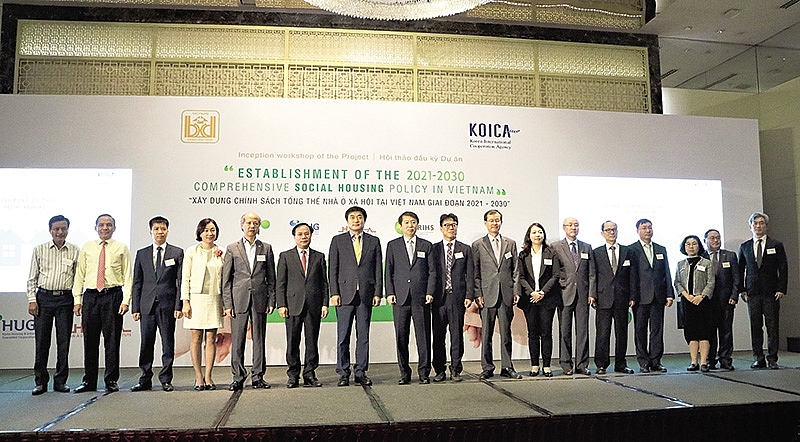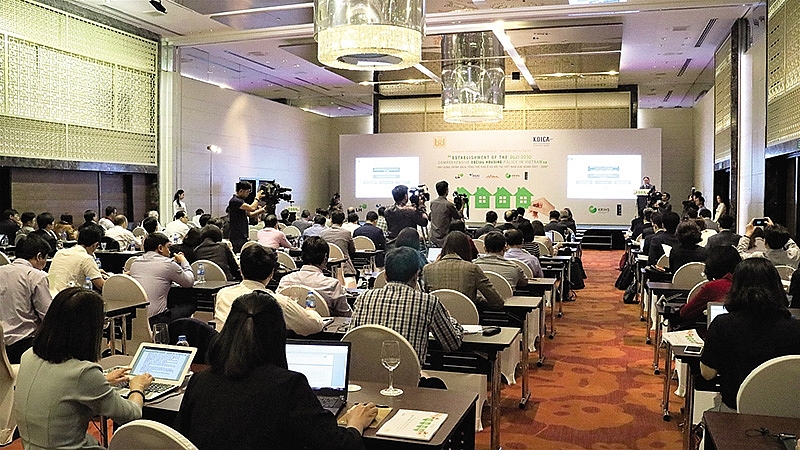
Kim Jin-oh, country director of KOICA in Vietnam (seventh from left) and participants at the workshop.
On February 21, the Korea International Cooperation Agency (KOICA) and the Ministry of Construction (MoC) jointly organised the Inception Workshop for the project entitled “Establishment of the 2021-2030 Comprehensive Social Housing Policy in Vietnam,” with the attendance of Deputy Minister of Construction Nguyen Van Sinh and country director of KOICA in Vietnam, Kim Jin-oh.
The Vietnamese government has long been considering housing as a social issue and a priority mission in the national socio-economic development agenda. This includes developing social housing for marginalised groups such as low-income households in urban areas and labourers working at industrial parks, which received great attention from both legislators and the public.
Social housing is a pressing need in the context of rapid urbanisation in Vietnam, as big cities are encountering difficulties to provide adequate housing to the increasing population.
Sinh addressed the lack of social housing in his opening remarks, saying, “Social housing development efforts so far have only achieved 33 per cent of the target of 12.5 square metres per person set by the approved National Housing Development Strategy by 2020 with vision toward 2030.”
In this context, a comprehensive legal framework which provides guiding principles for social housing provision and management is essential to increase the supply of social housing as well as to ensure access to affordable housing to marginalised groups.
It is a field where South Korea’s experiences in social housing development could be widely shared.
Jin-oh emphasised South Korea’s strength in formulating housing policies as well as the willingness of this nation’s government to support Vietnam to achieve the National Socio-economic Development Strategy and the National Housing Development Strategy.

Consultancy makes a presentation on a plan to implement the project.
The Comprehensive Social Housing Policy project is financed by the government of South Korea with the total budget of $3 million.
The project is implemented from 2018 to 2020 by the South Korean consultancy consortium, including Korea Land and Housing Corporation, Korea Housing & Urban Guarantee Corporation, Han-A Urban Research Institute, Korea Research Institute for Human Settlements, and Seoul National University.
The project aims to study and propose the Vietnam Social Housing Development Strategy during 2021-2030, and contribute to the amendment of Vietnam’s Law on Housing issued in 2014 in terms of social housing development, focusing on those low-income households in urban areas and labourers working in industrial parks.
Five project components are designed to realise these objectives.
The first component is focused on the assessment of the current situation of social housing for low-income households in urban areas and labourers working in industrial parks, while the second component will conduct surveys and create a projection of social housing needs for low-income households in urban areas and labourers working in industrial parks in the 2021-2030 period.
The third component is about the development of social housing policies applicable for the target groups (low-income households in urban areas and labourers working in industrial parks) by referring to international experiences.
While the fourth component is centred on the improvement of the Law on Housing to enable the social housing policy suggested by the project, the fifth component involves a capacity building programme for public officials in the management of social housing development.
The inception workshop opened a platform for fruitful discussion on social housing issues among representatives of central ministries and agencies, local governments, research institutes, real estate associations, development partners, as well as domestic and foreign investors in the housing sector.
As housing is an important issue in Vietnam’s development agenda, the effective multi-disciplinary co-ordination among various stakeholders throughout the project’s implementation will definitely be the key to success.
|
The Korea International Cooperation Agency (KOICA), as a South Korean government-funded agency, is dedicated to providing grant aid programmes. KOICA currently operates 44 overseas offices in 44 partner countries globally. Established in 1994, the KOICA Vietnam Office aims to develop Vietnam from a middle-income country to a modernised and industrialised nation, and to establish a foundation for sustainable growth by aligning its objectives and priorities with the national socio-economic development strategies and plans. KOICA’s priority sectors in the 2016-2020 period in Vietnam include: - Governance (public administration); - Education; - Water management and health; and - Transportation and urban infrastructure. |


















